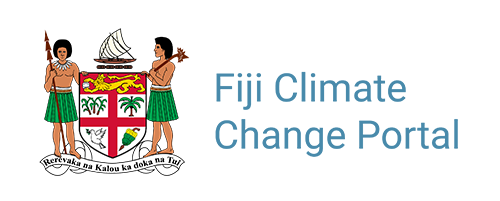The Climate Change Division of the Office of the Prime Minister as the National Designated Authority (NDA) Secretariat is the fundamental intermediary and point of communication between stakeholders in Fiji and the Green Climate Fund (GCF). The NDA is the Honourable Prime Minister with the Director of the Climate Change Division as his representative. Furthermore, NDA is the authority that the GCF recognizes for all legal matters pertaining to the GCF and is the official signatory on behalf of the Fijian government. The NDA provides broad strategic oversight of the GCF activities in the country.
The NDA formally communicates to the GCF which provides a detailed level of clarity including the roles and responsibilities of all stakeholders. The NDA is a crucial actor in ensuring the country-ownership principle of the GCF and driving ambitious action on adaptation and mitigation through access to GCF resources.
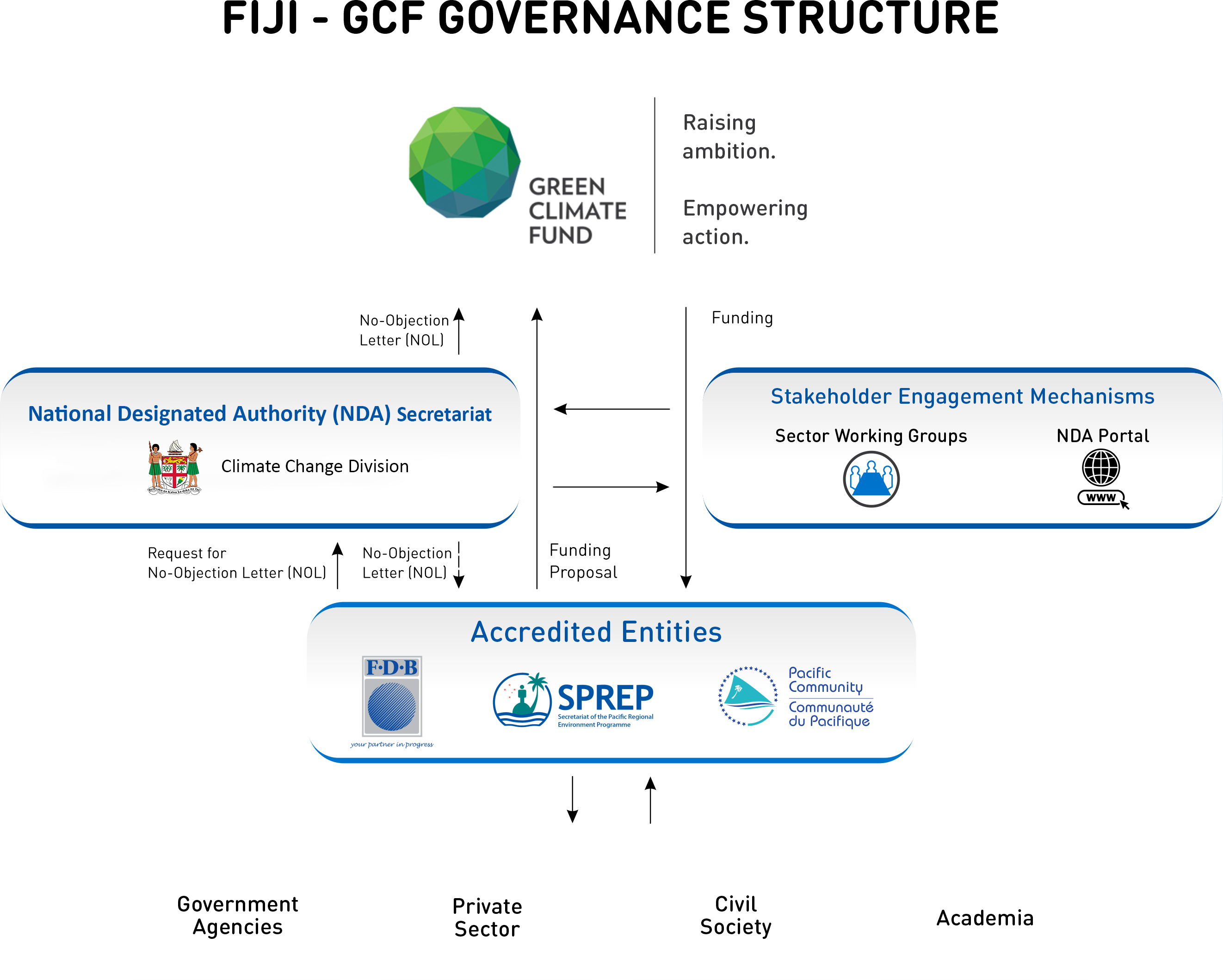
NDA Secretariat
The NDA Secretariat is facilitated and supported by the Climate Change Division (CCD) within the MoE.
The CCD is the responsible national agency for addressing climate change policy issues in Fiji. This includes the coordination of domestic climate finance. The CCD is guided by the Fiji Climate Change Act 2021 and the Fiji National Climate Change Policy 2018 – 2030 (NCCP).
The Fijian Climate Change Bulletin keeps members regularly informed and updated on activities, projects, and current news.
Climate Finance



Sector Working Groups (SWGs)
The SWGs are part of the multi-stakeholder and multi-sector NDA coordination mechanism. They enable the engagement, information exchange and communication with internal and external stakeholders, like a community of practice. Four SWGs are currently operational.
Two types of SWG membership cover:
- Consultative Members – Selected as a manageable lean group of experts to provide advice, feedback, and recommendations.
- Open Members – A general community of practice to participate in events such as seminars, public consultations, training etc
Further information about the SWG comprises:
- Concept note for establishing the SWG
- Terms of Reference – Consultative membership
- Terms of Reference – Open membership
- Information to join the groups.
Fiji’s Sector Working Groups

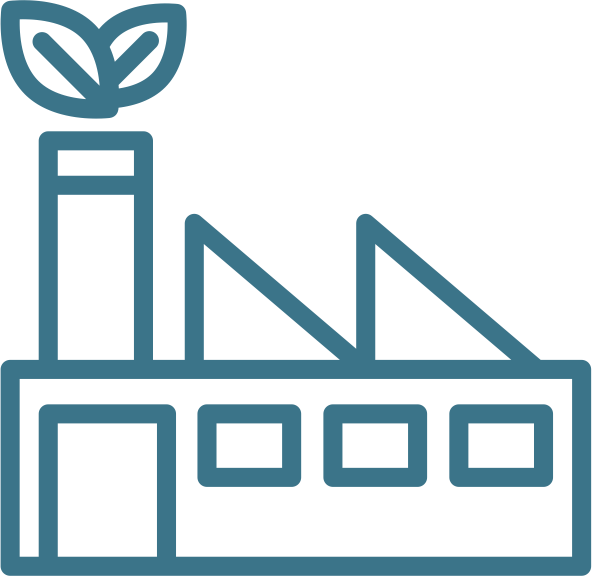

Green Climate Fund (GCF)
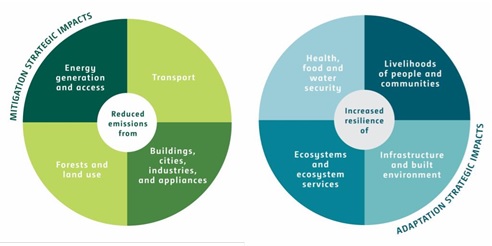
The eight strategic results areas of GCF (Source: GCF, 2018)
GCF is a global climate finance fund created to support the efforts of developing countries to respond to the challenge of climate change. GCF was set up in 2010 by the 194 countries who are parties to the United Nations Framework Convention on Climate Change (UNFCCC), as part of the Convention’s financial mechanism.
The Fund seeks to promote a paradigm shift to low‐emission and climate‐resilient development, considering the needs of nations particularly vulnerable to climate change impacts.
GCF activities are aligned with the priorities of developing countries through the principle of country ownership. The disbursement of funds by the GCF must be consistent with the national objectives of the countries where projects and programs will be taking place.
Fiji currently has one direct access entity (DAE): Fiji Development Bank and the Ministry of Economy is currently in its accreditation application phase to become a DAE for the GCF
The GCF finances low-emissions and climate-resilient projects and programmes under eight strategic impact areas:
Executing Entities (EE)
Executing Entities (EEs) are institutions responsible for the execution of projects or programmes funded by the GCF. They can be entities from the public, private and CSO sectors. Essentially, AEs can be EEs as well.
EEs do not get direct access to the GCF, in contrast to accredited entities. EEs ensure that GCF projects are delivered in accordance with project objectives.
EEs must demonstrate specific criteria and qualifications, for example:
- Proven track record in implementation and monitoring of climate project/programme;
- Transparent system for data management and record keeping and archiving;
- Appetite for implementation and ensuring ownership and demand driven concepts and project ideas and its formulation;
- Absorptive capacity to implement and Monitoring, Reporting and Verifying (MRV) of project/programme and to scale up and replicate the solutions beyond the one-off project;
- Strong business acumen and entrepreneurial spirit; and
- EEs will need to be trained and fully capacitated in the skills and knowledge to access and utilize climate finance.
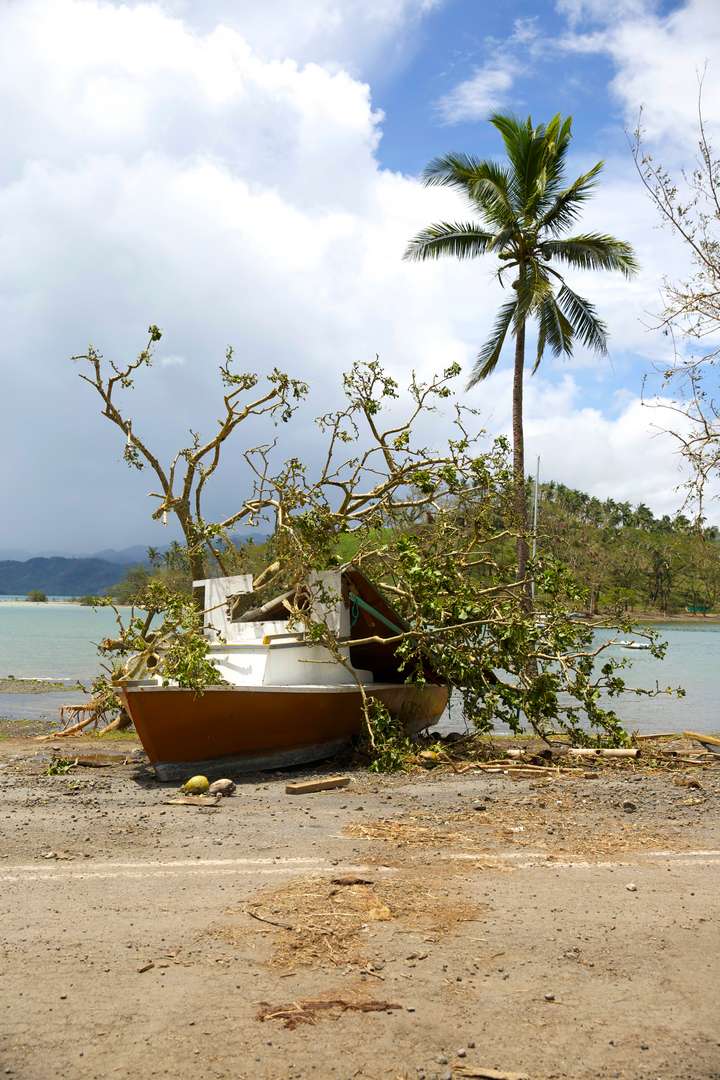
Accredited Entities (AE)
Accredited Entities are institutions that can access funding from the GCF, after an accreditation process. There are different types of the GCF Accredited Entities, based on access modalities:
- Direct Access Entities: Fiji Development Bank (FDB) and MoE
- Regional Accredited Entities
- International Accredited Entities
Organizations with specialized climate action capacities can apply to become the GCF Accredited Entities. They can be private, public, non-governmental, sub-national, national, regional, or international bodies. They should have clear, detailed, and actionable climate change projects or programmes to present to the GCF. They must also meet the GCF standards such as financial standards, environmental and social safeguards, and gender equality and social inclusion (GESI). Accredited Entities develop funding proposals for consideration by the GCF. They also oversee, supervise, manage, and monitor their respective GCF-approved projects and programmes.
Direct Access Entities (DAE)
The Fiji Development Bank (FDB) is accredited for micro size projects which are capped at USD 10 million. These projects could be used as loan, equity, or guarantee. So far, the FDB has one GCF approved Simplified Approval Project (SAP): SAP016 Fiji Agro-photovoltaic Project in Ovalau (USD 10 million). The FDB was accredited as DAE to the GCF in Oct 2017.
The FDB is a national public sector entity and Government-owned development bank based in Fiji. The main objectives are facilitating and stimulating the promotion and development of natural resources, transportation, other industries, and enterprises in Fiji. Special consideration and priorities include the economic development of the rural and agricultural sectors of the economy.
The MoE is currently applying for DAE accreditation to broaden the Fijian GCF portfolio. The MoE targets medium size projects of up to USD 250 million as grant and guarantee.
Direct Access Entities (DAE) are sometimes also called National Accredited Entities.
Regional Accredited Entities (RAE)
The Secretariat of the Pacific Regional Environment Programme (SPREP) is a Regional AE to the GCF since May 2015. SPREP intends to apply GCF resources as grants. It targets adaptation and mitigation projects focusing on Small Island Developing States (SIDS) and building national capacity to address climate change. To date, SPREP has one GCF approved project: FP035: Climate Information Services for resilient development in Vanuatu (USD 26.6 million).
SPREP is based in Apia, Samoa. It focuses on climate change and environmental issues affecting SIDS in the Pacific. SPREP supports action on climate change in the key areas of adaptation, mitigation, policy and science. SPREP intends to build upon its current experience. Future focus includes integrated approaches to addressing climate change, disaster risks, and ecosystem-based adaptation projects and programmes in SIDS.
The Pacific Community (SPC) is accredited under the small project scale (<USD 50 million) and Cat B (Medium Risk Category) since February 2019. SPC currently has one GCF approved project: FP169: Climate change adaptation solutions for Local Authorities in the Federated States of Micronesia (USD 19.7 million).
The SPC headquarter is based in Noumea, New Caledonia. It is the regional principal scientific and technical organization supporting development in the Pacific region. SPC focuses on sustainable economic development, empowered and resilient Pacific communities and enhanced health and livelihoods of Pacific people with a view to achieving its members’ development goals.
International Accredited Entities (IAE)
Different United Nations agencies with offices in the Pacific are IAEs. This includes the:
- United Nations Development Programme (UNDP)
- Food and Agriculture Organization (FAO)
- United Nations Environment Programme (UNEP)
Multilateral development banks and other entities include the:
International Non-Government Organizations (NGOs) include the:
